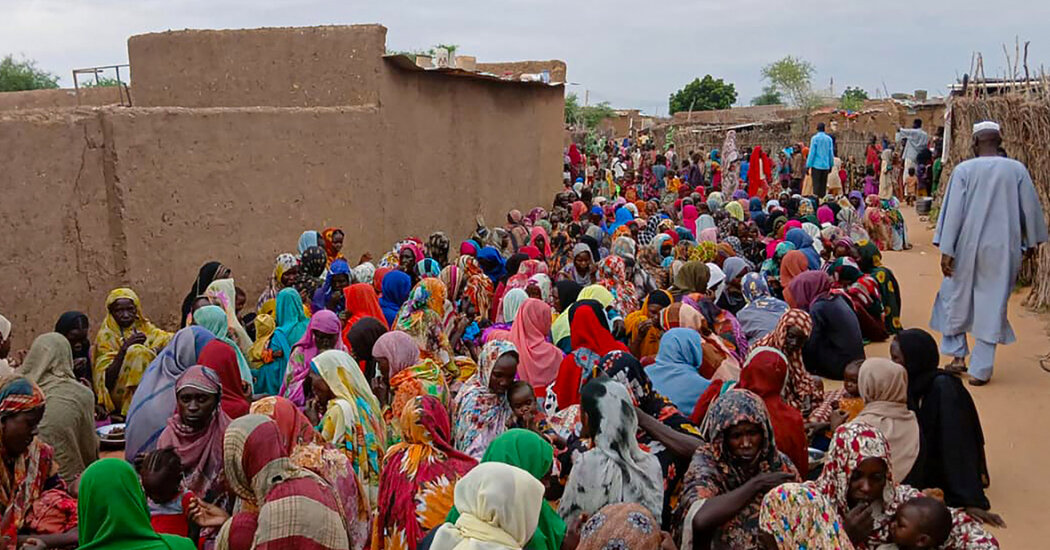A Sudanese paramilitary group said it had seized the army headquarters in the besieged and famine-stricken city of El Fasher in western Sudan, in a potentially decisive shift of a long and brutal battle.
In a statement, the Rapid Support Forces, or R.S.F., said it had seized the Sixth Division Headquarters of Sudan’s military in El Fasher, its last major obstacle to the control of the sprawling western region of Darfur.
Officials with Sudan’s military did not immediately respond to requests for comment. Local reports, which could not immediately be independently confirmed, said that Sudanese military troops and allied Darfuri militias had retreated to residential parts of the city, which has a current estimated population of 260,000 people.
It was unclear if the R.S.F. was about to take the city outright, with reports of continued fighting in several places. A senior official with an aid group working in Darfur said the situation in the city remained “extremely fluid” amid intense fighting in the south and west of the city.
There appeared to be fractures between the military and its Darfuri allies, known as the Joint Forces, said the aid official, who spoke on the condition of anonymity to protect the safety of staff on the ground. Military-aligned fighters posted videos to Facebook, which could not be immediately verified, saying they continued to fight. Gunfire and explosions rang out in the background.
Thousands of civilians were streaming out of the city, several aid workers said. Video footage circulating online showed a long column of people trudging through a dusty field as R.S.F. soldiers drove past.
In several parts of Darfur, R.S.F. fighters fired their guns in celebration. “A great victory has been achieved,” the group’s statement said.
But among other Sudanese, those scenes stoked fears of violent retribution and even ethnic cleansing in El Fasher.
For over a year, American and other officials have warned of a potential massacre if the city fell to the R.S.F. Many fear a repeat of the ethnic slaughter in El Geneina, another city in Darfur, where up to 15,000 civilians were killed after the R.S.F. captured it in late 2023, according to the United Nations.
The aid official said that numerous arrests had taken place in El Fasher on Sunday morning, and a list that circulated on R.S.F. social media channels named Sudanese army officers the group was looking for.
The R.S.F. has been laying siege to El Fasher since April 2024 in a brutal assault that set off a famine in the city, cleared out a camp filled with about 500,000 displaced civilians and saw numerous drone and artillery strikes on hospitals and homes. The army headquarters was the military’s last major outpost in western Sudan.
Gaining control of El Fasher would be a major victory for the R.S.F., giving it control over all major urban centers in Darfur.
R.S.F. control of the area would hasten a de facto split of the vast African country, with the paramilitaries ruling the western and southwestern regions, and the army ruling the east and the capital, Khartoum.
The R.S.F. redoubled its effort to capture El Fasher after its fighters were expelled from Khartoum, in April. In May, it began to build a tall earthen berm around El Fasher, cutting off vital supplies of medicine and food.
People trapped in El Fasher were reduced to eating animal feed to survive. Those who managed to flee reported sexual violence against women and targeted killings of men. Satellite images show that the berm is now 35 miles long, completely encircling the city.
At the same time, the R.S.F. has deployed armed drones across the country, striking targets in the de facto wartime capital, Port Sudan, and, in recent weeks, at the country’s main airport in Khartoum, which the army hopes to reopen.
Much of the R.S.F.’s most sophisticated weaponry has been supplied by the United Arab Emirates, its main foreign sponsor, although the group has also benefited from tacit support from Emirati-allied leaders in neighboring countries, including Chad, Libya and Ethiopia.
Sudan’s army has struck back with sophisticated drones, including models produced in Turkey and Iran.
Diplomatic efforts to stop the fighting in Sudan have floundered, although President Trump’s envoy to Africa, Massad Boulos, announced a new peace plan in September after talks with diplomats from Saudi Arabia, Egypt and the U.A.E. After hosting another meeting of that group on Saturday in Washington, Mr. Boulos said that Mr. Trump “wants peace” in Sudan.
Abdalrahman Altayeb contributed reporting from Port Sudan, Sudan.

